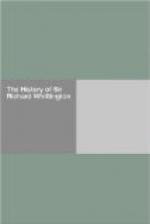In the year 1497, when Sir Richard Whittington was first elected Lord Mayor, that rebel Sir John Oldcastle was taken in the territories of the Lord Powess, not without danger and hurt of some that took him, at which time all the States of the realm were assembled at Parliament in London, therein to provide the King of a subsidy and other aid of money and ammunition, who took great pains beyond the seas in France. These Lords and others when they heard that the publick enemy was taken they agreed all not to dissolve the Parliament, until he were examined, and heard to answer in the same. Whereupon the Lord Powess was sent for to fetch him up with power and great aid, who brought him to London in a lyter wounded very much having received seventeen wounds and also a clerk which he called his Secretary with him that was of his counsel in all his secrecy. As soon as the aforesaid Sir John Oldcastle was brought into the Parliament before the Earl of Bedford who was then left Regent and Governour of the Realm in the time of the King’s absence being in France and other Lords and States, his indictment being read before him of his forcible insurrection against the King and State in St. Gyles’s Fields, and other treasons and outrages by him committed, the question was asked how he could excuse himself and show why he should not be judged to dye according to the law. But he seeking other talk and discourse of the mercies of God, and that all mortal men that would be followers of God ought to prefer mercy above judgment and that vengeance pertained only to the Lord, and ought not to be practised by them that worship, but to be left to God alone, with many other words to protract the time, until the Lord Chief Justice admonished the Regent not to suffer him to spend the time so vainly, in molesting the nobles of the Realm, whereupon the Duke of Bedford, Regent, commanded him to answer formally and punctually to the matter laid to his charge.
Then said Sir John, being thus urged at last after deliberation taken, he said, It is the least thing that I account of to be judged by you as of man’s judgment, and again he began to talk, but nothing to the purpose until the Chief Justice commanded him again to answer finally, and to answer them if he could, why he should not suffer death according to his desert. To which he stoutly answered that he had no judge amongst them, so long as his liege Lord King Richard was alive and in his realm of Scotland, which answer when he had made, because there needed no further witness, he was then presently censured to be drawn and hanged on a gallows and then to be burnt hanging upon the same, which judgment was executed upon him the thirtieth day of December in St. Gyles’s Fields, where many honourable persons were present, and the last words that he spake were to Sir Thomas Upingham, adjuring him that if he saw him rise from death to life again the third day he would procure that his sect which he had raised might be in peace and quiet. He was hanged by the neck in a chain of iron and after consumed by fire.




